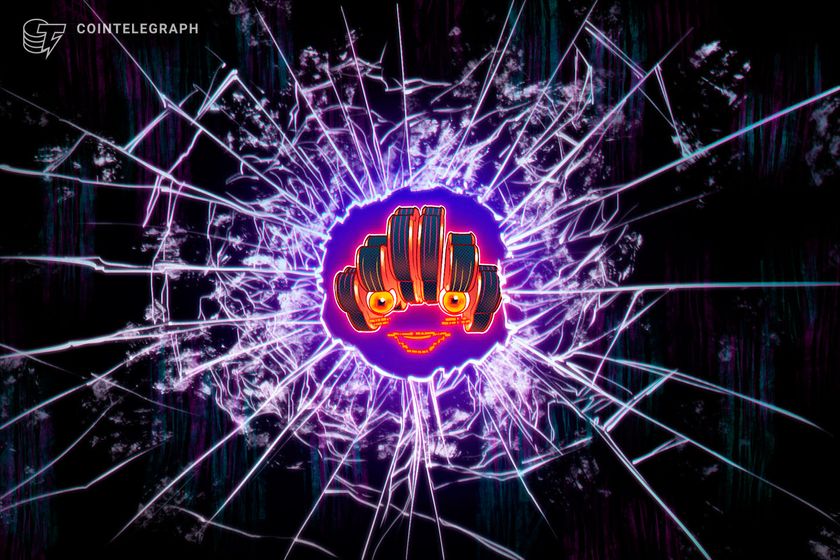From Netflix series to crypto game: Black Mirror’s AI reputation system, explained



Black Mirror experience: When sci-fi social scores meet blockchain
Created by Charlie Brooker, this British sci-fi series debuted in 2011 and quickly became a cultural touchstone for its dark, satirical take on technology.
Imagine a world where every like, comment and blockchain transaction shapes your social standing, where an AI watches your every digital move and assigns you a score that dictates your rewards or your restrictions.
Sounds like something straight out of science fiction, right?
Well, it is — until now. Black Mirror, Netflix’s chilling anthology series, and one of its most iconic concepts have inspired a real-world crypto game.
Dubbed the Black Mirror Experience, this project brings the show’s AI-driven reputation system to life, blending dystopian storytelling with blockchain technology.
If you haven’t seen Black Mirror, you must know that each standalone episode dives into a different scenario — think surveillance gone wild, social media obsession run amok or AI with a mind of its own. It’s not exactly feel-good TV, but it’s gripping, thought-provoking and often uncomfortably close to reality.
The episode that sparked this crypto game is “Nosedive” from Season 3. Picture this: a pastel-colored world where everyone rates each other on a five-star scale after every interaction. Your average score isn’t just a badge of honor, but it determines your job prospects, housing options and even how people treat you.
The protagonist, Lacie, spends her days chasing approval, plastering on a smile to boost her rating. It’s a biting critique of performative social media culture, and now, it’s the blueprint for a blockchain-based experiment.

Did you know? Reputation systems predate AI and are rooted in human trust mechanisms like word-of-mouth and credit scores. The internet era introduced digital versions, such as eBay’s feedback system in the late 1990s, where buyers and sellers rated each other. These manual systems were simple but vulnerable to fake reviews and retaliation.
How Black Mirror Experience works
Built on the KOR Protocol, this dystopian game uses AI to rate your social and blockchain activity, turning your digital behavior into real Web3 rewards or penalties.
The Black Mirror Experience is built on a transparent and tamper-resistant system developed by major players in gaming and blockchain tech, including Animoca, Niantic and Avalanche.

At its core is Iris, an AI virtual assistant that’s equal parts judge, jury and scorekeeper. To join the fun:
- You connect a compatible crypto wallet and your X account.
- From there, Iris gets to work, analyzing your online behavior, such as your posts, your follows and your blockchain moves, and assigns you a reputation score.
This isn’t just a vanity metric; your score unlocks real perks in the Black Mirror universe, like token airdrops, early feature access and voting power in narrative-driven events.
Lower scores?
Well, you might find yourself locked out of the good stuff. Every user gets a Social ID Card and a non-fungible token (NFT) that logs your score and tracks your digital footprint over time. This NFT tracks behavior through digital badges — awarded for positive actions — and “stains,” which mark negative ones, creating a transparent audit trail readable by other applications.
Beyond its role in the game, the Social ID Card doubles as a portable Web3 identity and onchain passport, allowing users to carry their reputation across the Black Mirror Web3 ecosystem. Iris evaluates a wide range of activities, from holding or trading tokens and NFTs to engaging with decentralized communities and posting on social media, distinguishing genuine contributors from trolls or scammers.
But what powers this reputation system behind the scenes?

Blockchain is the backbone here. Every action you take, whether it’s posting on X or trading tokens, gets recorded on the ledger. Your reputation score? Calculated by smart contracts, not controlled by a hidden authority.
Did you know? The project has already gained traction, with over 13,000 reputation IDs claimed, signaling early interest.
What’s the catch? Implications of the AI reputation system
A game where your online presence can earn you rewards sounds interesting. But, like any Black Mirror story, there’s a darker layer to consider.
To start, Iris needs access to your data to function. That includes your social media activity and blockchain history. While the system claims to be “fair and transparent,” who’s overseeing it? How is the data stored? And what happens if it gets leaked or misused?
Gamifying behavior might encourage a more positive digital environment, but it could also push people to curate their actions for approval, similar to Lacie’s forced smiles in “Nosedive.”

The bigger concern is who decides what counts as “good” behavior. Algorithms can lack nuance, and if the system is biased, it could end up punishing users unfairly or reinforcing existing divides.
And this isn’t just fiction. China’s social credit system, introduced in 2014, assesses citizens’ trustworthiness based on behaviors like paying taxes or purchasing domestic products. Positive actions can boost one’s score, while negative behaviors, such as committing crimes or making unfavorable statements about the government, can lower it. Consequences for low scores include reduced access to credit and fewer business opportunities.
The Black Mirror Experience may be a game, but it hints at how reputation tech could shape the future.
Did you know? Nosedive isn’t the only Black Mirror episode to explore reputation systems. Hated in the Nation also showed how social media can become a weapon.
Risks every Black Mirror Experience game player should know
While the Black Mirror Experience offers a thrilling dive into a dystopian world, blending cutting-edge tech with Black Mirror’s signature unease, it’s not without its risks.
- Data privacy concerns: Your personal information, including social media activity and blockchain transactions, could be vulnerable to leaks or misuse. Even with blockchain’s security, no system is entirely hack-proof.
- AI bias: Iris, the AI, might misinterpret your actions, leading to unfair reputation scores. This could lock you out of rewards or tarnish your digital identity without a clear way to appeal.
- Performative behavior: The game’s reward system might encourage users to act in ways that boost their scores rather than being authentic. This could create a culture of fake positivity, mirroring the dystopian themes of Black Mirror.
- Psychological stress: Constantly being rated and ranked can take a toll on mental health, leading to anxiety or obsession over your score. The pressure to maintain a high reputation could spill over into real life, blurring the lines between game and reality.
- Normalization of dystopian systems: By gamifying a reputation system, the project risks making such concepts seem normal or even desirable. This could desensitize users to the potential dangers of real-world social credit systems.
That said, it’s important to remember that the Black Mirror Experience is a bold experiment. It’s pushing boundaries, merging entertainment with Web3 in ways we’ve never seen. The risks are real, but so is the innovation. As with any tech that blurs the line between fiction and reality, the key is to stay aware and maybe watch your score, but don’t let it rule you.








